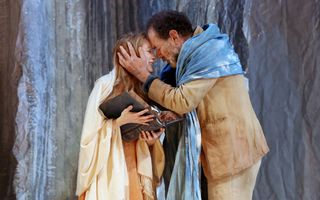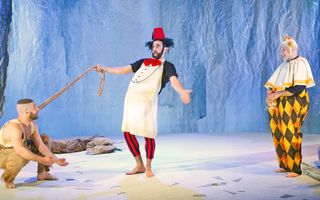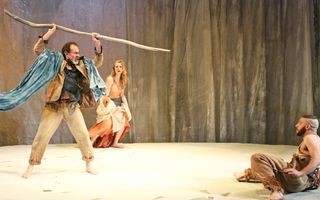 Watch
Watch
PROSPERO
Though with their high wrongs I am struck to the quick,
Yet with my nobler reason ’gainst my fury
Do I take part: the rarer action is
In virtue than in vengeance.
Act 5, Scene 1
Prospero is the former Duke of Milan, a master magician, and father of Miranda. When Prospero was Duke, he neglected day-to-day matters in favour of his own studies, which gave his brother Antonio the chance to usurp him. Prospero is an enigmatic character and full of contradictions. He demonstrates an immense love for his daughter yet is controlling of her. He has protected Miranda her entire life, yet gives her to Ferdinand instantly and willingly. He has a mastery of language yet is often overly verbose. He has been wronged by his brother, yet he himself wrongs others, and so it is not easy to sympathise fully with him. He is vengeful, yet learns to forgive.
Betrayed by Antonio and set adrift in a leaky boat with his infant daughter Miranda, Prospero landed on the island, where he has been exiled for the past 12 years. In that time, he has raised his daughter single-handedly and made Ariel, Caliban, and the other spirits of the island his servants. Prospero has enslaved both Ariel and Caliban to different degrees, and both wish to be freed of him. He does however treat Ariel with more kindness than he does Caliban. While he gives Ariel words of affection and often thanks Ariel for doing his bidding, he treats Caliban with great scorn and contempt.
His time on the island has also given Prospero time to think about the possibility of revenge. The main driving force of the plot is Prospero’s personal journey from planning revenge to accepting reconciliation and forgiveness. He describes his great love of study and books, which originally caused him to neglect the government of Milan. Much is made of his great magical power, which he uses to control the actions of others and orchestrate his revenge. He shows no doubts about his right to give orders to Ariel, Caliban, Miranda and even Ferdinand. At the end of the play Prospero rejects not only vengeance but his magic, and resolves to return to Milan and re-join society.
Prospero is a controlling figure – not only of Caliban, Ariel, Miranda, Ferdinand, and other spirits, but also of the narrative. . However, his plan eventually resolves with detachment, and the relinquishing of control, and as the audience we witness Prospero wisen, soften and let go.
MIRANDA
O, I have suffered
With those that I saw suffer
Act 1, Scene 2
Miranda is Prospero’s young daughter, who has lived on the island since she was a baby. Because of her limited life experience, Miranda is naïve and sheltered. She has had no interactions with society or other humans outside of her father and Caliban, until the shipwreck occurs. She cannot even remember seeing another woman in her life. She has a sweet, compassionate nature, and has never been told about her true identity or former life. At the beginning of the play, Prospero finally reveals the entire backstory to her, but puts her into a deep sleep before she can ask too many questions. Prospero is entirely controlling of Miranda’s life experiences, even selecting Ferdinand for her as suitor, and literally leading him to her while she is asleep.
Ferdinand is the first human outside of her father and Caliban that Miranda has ever seen. She is at once amazed and enthralled by him:
I might call him
A thing divine, for nothing natural
I ever saw so noble.
Act 1, Scene 2
Miranda’s open and trusting nature is shown in the way she immediately tells Ferdinand how she feels about him, as she has never had the chance to learn from observation or experience to be cautious or circumspect. When Ferdinand first sees her, he thinks she must be the goddess of the island. Her name means ‘admirable’, which Ferdinand makes a little joke about when he calls her “admired Miranda” (Act 3, Scene 1). It appears as though Shakespeare invented the name ‘Miranda’ for this play, as it doesn’t appear in English literature before the date of The Tempest.
Miranda’s final line in the play is her exclamation when she sees King Alonso and his companions arriving at her father’s cell: “O brave new world, / That has such people in’t!” Like many of Shakespeare’s young female characters who have been central to the action, including Viola (Twelfth Night), Isabella (Measure For Measure) and Jessica (The Merchant of Venice), she has no further dialogue as the story wraps up. It is therefore left to the actor and director to interpret what Miranda thinks of the events of the end of the play, including saying farewell to Caliban and Ariel, and being named the next Queen of Naples.
FERDINAND
I am the best of them that speak this speech...
Act 1, Scene 2
Ferdinand is the son of Alonso, the King of Naples, and Miranda’s love interest. As a Prince, he outranks everyone except his father – including, arguably, Prospero. In direct contrast to Miranda, Ferdinand is shown to be cultivated and experienced in the ways of the Court and the rules of the upper echelons of human society. From the tradition of the courtly lover, Ferdinand is happy to fulfil demanding physical tasks to earn the hand of the girl of his dreams. Prospero has planned all along for Ferdinand and Miranda to fall in love, but considers it important to test Ferdinand’s commitment, “lest too light winning / Make the prize light” (Act 1, Scene 2). Ferdinand is skilled with language and easily converses with Miranda using romantic poetry:
Hear my soul speak:
The very instant that I saw you, did
My heart fly to your service; there resides,
To make me slave to it...
Act 3, Scene 1
Ferdinand is respectful, honest and exudes gentlemanly behaviour. When Prospero speaks to Ferdinand pointedly about Miranda’s chastity, Ferdinand reassures him that he would not put lust before honour. Even when Prospero orders him to carry a “thousand” heavy logs to prove his worthiness for Miranda, Ferdinand does not complain, saying:
This my mean task
Would be as heavy to me as odious, but
The mistress which I serve quickens what's dead
And makes my labours pleasures...
Act 3, Scene 1
Ferdinand spends much of the play believing his father, the King, is dead. Therefore, Ferdinand believes he may already be King of Naples. When King Alonso is found to be alive, Ferdinand immediately tells his father about his commitment to Miranda.
CALIBAN
You taught me language, and my profit on’t
Is, I know how to curse.
Act 1, Scene 2
Caliban is a native of the island, and son of the witch Sycorax. Sycorax was banished to the mysterious island and then later died. When Prospero first landed on the island, Caliban showed him where to find food and water in his early days of exile. In return, Prospero and Miranda taught Caliban how to speak their language, which he now uses to express his anger: “You taught me language; and my profit on’t / Is, I know how to curse” (Act 1, Scene 2).
However, any former relationship between Caliban and Prospero has soured before the play commences. We are told that Caliban had attempted to assault Miranda, and is now harshly enslaved and treated as a menial worker by Prospero, who repeatedly calls him “slave” and other harsh names. Caliban carries wood for their fire and carries out manual labour.
Caliban loves the island, his home, deeply. He has a great knowledge and understanding of the features of the island. When Stephano and Trinculo are startled by Ariel’s music, Caliban replies poetically:
Be not afeard. The isle is full of noises,
Sounds, and sweet airs, that give delight and hurt not.
Sometimes a thousand twangling instruments
Will hum about mine ears, and sometime voices
That, if I then had waked after long sleep
Will make me sleep again; and then in dreaming
The clouds methought would open and show riches
Ready to drop upon me, that when I waked
I cried to dream again.
Act 3, Scene 2
As evidenced in the passage above and at many other times, for a character that is referred to as “savage”, Caliban has a great mastery of language and depth of feeling. Unusually for a low-status or comic figure, Caliban often speaks in verse rather than prose. The details of his looks are kept vague, but according to Trinculo he smells bad: “He smells like a fish; a very ancient and fish-like smell” (Act 2, Scene 2).
Caliban is easily misled into thinking Stephano is important, mainly because Stephano gives him his first experience of alcohol. His resentment towards Prospero is unequivocal, and he encourages Stephano and Trinculo to kill Prospero and take over rule of the island. Their plan goes awry, and at the end of the play, Caliban remains enslaved to Prospero, and even apologies to his “master,” saying “I'll be wise hereafter / And seek for grace.” (Act 5, Scene 1)
ARIEL
Do you love me master? No?
Act 4, Scene 1
Ariel is a spirit and is Prospero’s servant. We are told that Prospero freed Ariel after Caliban’s mother, the witch Sycorax, left him trapped in a tree. In return for freeing Ariel, Prospero demands his service, which Ariel agrees to for a limited time.
Ariel is a powerful spirit and is able to fly, to become invisible at any given moment, and to shape shift into forms like a harpy. Ariel is also able to perform tricks such as imitating voices and conjuring visions, which cause great confusion and chaos in the play.
Ariel attends to Prospero’s every bidding and diligently serves his master, reporting things he has witnessed to Prospero throughout the play. He appears to serve Prospero willingly, and sometimes even lovingly. Despite this, Ariel longs for freedom. In his very first exchange with Prospero, we see him ask to be freed, citing his good service to his master. Yet Prospero is unwilling to let Ariel go, as his powers are incredibly useful for him. It is only at the conclusion of the play after Prospero has finished his plans with Ariel’s help, that he no longer requires Ariel’s service, and finally frees him.
Despite not being human, Ariel convinces Prospero to take pity on his enemies, saying “were I human” he would feel “tender” and forgive them. (Act 5, Scene 1)
The Italian Lords - Alonso, Antonio, Sebastian
Thy dukedom I resign and do entreat
Thou pardon me my wrongs.
Alonso, Act 5, Scene 1
The “three men of sin” (Ariel, Act 3, Scene 3) who colluded to oust Prospero from his Dukedom are his chief target in creating the storm and bringing the travellers to his island.
Alonso is the highest ranking, as the King of Naples. His grief at believing his son, Ferdinand, is dead helps him transform into a more humane person. His brother Sebastian and Prospero’s brother Antonio, however, show no remorse – Prospero simply chooses to believe they are penitent, in order to forgive them. Antonio does not find it difficult to persuade the weak and cowardly Sebastian to attempt to kill his elder brother, in the hope of becoming king.
Gonzalo
I would with such perfection govern, sir,
To excel the golden age.
Act 2, Scene 1
Gonzalo is set apart from the other noblemen as being a man of loyalty and good heart. When Antonio usurped Prospero, Gonzalo aided Prospero and Miranda in their escape from Milan. While much humour is derived from Gonzalo’s tendency to talk endlessly about seemingly nothing, he actually reflects on important themes, including the magic of the island, the nature of good rule, Alonso’s desperation, and the final reconciliation of the brothers, Prospero and Antonio. These speeches by the kind old man are an important commentary on the events of the play.
Stephano and Trinculo
The king and all our company else being drowned, we will inherit here.
Stephano, Act 2, Scene 2
Trinculo, Alonso’s jester, and Stephano, a drunken butler, are two minor members of the shipwrecked party. The word ‘butler’ actually means the handler of the butt, that is, the person in charge of the wine storage cask. When these comic characters join up with Caliban they provide a comic foil to the other, more powerful, plotters, and the darker action of the play. The pettiness of their drunken antics and dispute serves to deflate the arguments and powerplay of Prospero, Antonio, Alonso and Sebastian.






